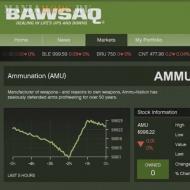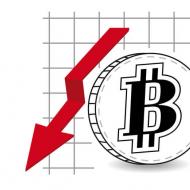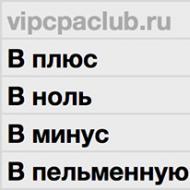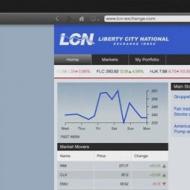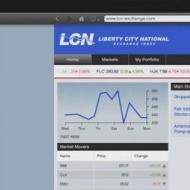
Single register of collector agencies. FSSP of Russia published the register of legal collection organizations. What to do if collectors do not have licenses
From January 1, 2017, only those collector agencies can work with the debtor, which were included in a special registry. Where is this registry and how to make citizens helping the collector?
This year, all debtors fell to the long-awaited protection of the law, which regulates the activities of the collectors. In accordance with the law, all collection agencies should be included in a special registry.
Only agencies included in the registry can interact with a citizen and ask him why he still has not returned.
To get into this registry, companies must fulfill a number of important requirements, among which there is a condition about the presence of pure assets In the amount of at least 10 million rubles. Such restrictions, according to the plan of lawmakers, fly off the market of unscrupulous players who are not interested in long-term development.
Where is the registry?
The registry is located on the website of the Federal Bailiff Service. To familiarize yourself with it, you need to select the "Services" section. In the list that opens, you should choose a section that is devoted to the state history of Jurlitz, carrying out activities to return overdue debts.
As of July 11, 2017, the list contained information about 131 companies. They can work with debtors today. In addition to the name of the collection agency in the registry, such important information as OGRN, the Inn Company, the site name, the date of inclusion in the registry, information about the contract mandatory insurance responsibility.
How to check the collector on the registry?
The procedure for the actions of the debtor, who, for example, called the collector, is very simple. By law, with each interaction with the debtor, the collector must call his name, the name of the company he represents.
Next, the borrower, taking advantage of his right, can ask the collector for a moment to check the information with the help of the call, most likely, the company will not agree, since they are allowed to call the debtors no more than 1 time per day.
Therefore, while the collector will hang on the wire, the citizen will have the opportunity to quickly look into the registry on the FSSP website. In order not to view the entire registry, you must use the "Find" browser function and enter the name of the company in the stitching line. If the search has succeeded, and the company is really present in the registry, then a citizen can continue his negotiations with the recoverer.
What if the collector violates the rules?
This behavior is explained by the reputation of collectors. Even after the entry into force of the law, protecting the rights of debtors, it cannot be said that the framework of the legislation is observed everywhere.
So, if the debtor faced the fact that, for example, the collector calls, not believing with the permitted number of calls, then the time to sit at the complaint. If the company consists in the registry and violates the law, then contact the complaint to the federal service of bailiffs, which today looks after the market.
And what to do with collectors who do not consist in the registry? What if at that end of the wire, violating all the requirements of the law, threaten, blackmail debtors? Here, unfortunately, the bailiffs will not help. It is necessary to refer to the law enforcement a statement.
This article consists of one part, affects topical issues on the transfer of credit debt to the Bank to third parties, most often with collector organizations. And the article also affects the urgent issues of the legitimacy of collectors for collector recovery, given the new judicial practice.
Paragraphs of article are the following:
Right of the Bank and Microfinance Organizations on the transfer of debt on a loan agreement to third parties
Debt debt recovery is governed by Federal Law of 03.07.2016 No. 230-FZ "On Protection of Rights and Legal Interests individuals When carrying out activities to return overdue debts and on amending the Federal Law "On Microfinance Activities and Microfinance Organizations".
Reliefs, microfinance organizations and collector organizations have the right to recover overdue debts. True, the right of the latter on the recovery of overdue debts is almost no longer regulated by law. Banks and microfinance organizations have the right to transmit overdue debts to third parties. The transfer of debt on a loan agreement or loan (on overdue debt) by concluding an agency agreement or through a cessia agreement.
In the first case, the organization with which the contract concluded is valid in the interests of the lender or the lender. In the second case, it is an independent recoverer. Under the CESSIA Agreement there are two faces - Cedent and Cession. CEDENT and CESSIONARY relations are regulated by chapter 24 Civil Code Russian Federation. It should be borne in mind that, according to Art. 388 of the Civil Code of the Russian Federation, the assignment of the requirements of the censionary grade is allowed only if it does not contradict the law.
At the same time, according to Part 1 of Art. 12 Federal Law "On the protection of the rights and legitimate interests of individuals in the implementation of activities on the return of overdue debts and on amending the Federal Law" On Microfinance Activities and Microfinance Organizations ", in the cessionary, which is transmitted overdue, activities to return overdue debts should be the main. Failure to comply with this rule may be a reason for recognizing a cessia agreement invalid. Cessia agreement may be invalid and on other reasons, but this is already the topic for a separate article.
The concept of a banking license
According to Art. 13 of the Federal Law of 02.12.1990. No. 395-1 "On Banks and banking activities", Implementation banking operations It is made only on the basis of a license issued by the Bank of Russia in the manner prescribed by this Law, except in cases established in the Federal Law "On National payment system" There are various forms of banking licenses for banking activities. All licenses are posted in the register of issued licenses for banking operations. This register issued by credit organizations of licenses is obligatory is published by the Bank of Russia in the Bulletin of the Bank of Russia.
Implementation by the legal entity of banking operations without a license, if obtaining such a license is mandatory, entails penalties with such legal entity the amount obtained as a result of the implementation of such operations, as well as the penalty in the twofold amount of this amount in federal budget. Moreover, the Bank of Russia has the right to submit to such an organization statement of claim in court of Arbitration about its elimination.
For greater clarity to imagine the following situation.:
A certain organization received on the basis of a cessia agreement to demand the right to recover the debt in the amount of one hundred thousand rubles. The debtor agreed with the amount presented and redeemed the debt. In the future, it turned out that this organization does not have a banking license.
Accordingly, with this organization, not only one hundred thousand rubles should be recovered, but completely the amount of such operations, including the specified one. Also, with this organization, a fine should be recovered in the twofold amount of the entire amount on such operations. And so relative to each identified when checking the violation.
Accordingly, the banking license is a special document issued by the Bank of Russia the Organization for the exercise of banking operations by it, in the absence of which the organization is obliged to return all amounts received on operations carried out without a bank license and pay a fine in the two-time amount of this amount relative to each fact of such an operation. . The result may well be the bankruptcy of the organization, for example, the same collectors.
Collector organizations and the basis of their activities
A collector company is an organization that specializes in collecting debts and further recovery from debtors in favor of a bank or a microfinance organization for agency agreement, or in its favor if such debts have been redeemed by collectors under a cessia agreement.
The legal frameworks of the activities have already been established in the above law on the protection of the rights and legitimate interests of individuals in the implementation of activities on the return of overdue debts, as well as in the recently made definition of the judicial board on civil cases Supreme Court Of the Russian Federation of 05/14/2019 No. 67-kg19-2.
To carry out its activities, a collector organization should have a rather extensive list of documents, certified copies of which are obliged to provide the debtor upon his requirement. At the same time, only one collector from the relevant collector organization can directly interact with the debtor, and not the whole organization as a whole.
In order to interact with relatives familiar to the debtor, his employer, collectors must observe two conditions:
- the debtor must agree to such interaction;
- the third person to which the above persons do not express their disagreement.
Both conditions should be defined in writing. It should be noted that all listed persons, including the debtor himself, should not be incapacitated, persons who are treated in hospitals, disabled people of the first group, minors, except in cases of their emancipation in court.
Additional documents that should be guided under the regulation of the activities of collector organizations are the law of the Russian Federation of 07.02.1992 No. 2300-1 "On the Protection of Consumer Rights" and the Resolution of the Plenum of the Supreme Court of the Russian Federation of 28.06.2012 No. 57 "On Considering Civil Courts Affairs on disputes on the protection of consumer rights. "
Consumer Protection Act applies in terms of consumption banking servicesAnd when interacting with collectors, an individual who provided a debtor on a loan agreement is a consumer of these services, given that the Supreme Court of the Russian Federation in the above decree supports such a position.
Exercise by collector organizations to return overdue debts
To carry out its activities to refund overdue debts, collectors, first of all, should be guided by the Federal Law "On the Protection of the Rights and Legal Interests of Individuals in the implementation of activities to return overdue debts and amending the Federal Law" On Microfinance Activities and Microfinance Organizations ". As mentioned above, for collectors this activity Must be the main one. In addition, the collectors for their activities are obliged to be made to state Register. With this registry, you can find the site of the FSSP of Russia.
There are certain rules for the interaction of collectors with debtors to recover overdue debts. These rules are listed in Art. 4 of the Federal Law "On the Protection of the Rights and Legal Interests of Individuals in the implementation of activities to return overdue debts and amending the Federal Law" On Microfinance Activities and Microfinance Organizations ".
These include:
- personal meetings I. telephone conversationsthat otherwise referred to as "direct interaction";
- telegraph messages, text, voice and other messages (other messages Collectors are very often confused with threats, insults, bullying, mothers) transmitted through telecommunication networks, incl. mobile radiotelephone communication;
- postal departments at the place of residence or the place of stay of the debtor.
The listed interaction methods are not exhaustive, but other actions on interaction may be provided for only by a written agreement concluded between the collector organization and the debtor signed by both parties.
The federal law "On the protection of the rights and legitimate interests of individuals in the implementation of activities to return overdue debts and amending the Federal Law" On Microfinance Activities and Microfinance Organizations "establishes a restriction on the interaction of collectors with the debtor.
These restrictions include the following:
- the application to the debtor of the physical force or the threat of its use, the threat to the murder or causing serious harm to health is prohibited;
- destruction, damage to property, as well as the threat to the destruction or damage to property are prohibited;
- it is prohibited to use methods dangerous to life or human health;
- psychological pressure is prohibited in debtor and other persons, using expressions and other actions, degrading the honor and dignity of the debtor and other persons;
- the introduction of the debtor is misleading, relative to legal nature, size, causes of non-performance, limits of execution, etc. unfulfilled obligations;
- forbidden any other illegal causing damage to the debtor and other persons or abuse of the right.
And all the listed violations are the most favorite methods of collectors with the "interaction" with the debtor. It should be especially noted an example of such "interaction" of collectors with the debtor in the city of Iskitim Novosibirsk region, where collectors in the perverted form were raped by the debtor and family members. It is because of such cases of collectors, they consider "criminals, extortioners and criminals", which often corresponds to the truth.
More - less complies with the law, the activities of the collector organization LLC "Phoenix". But here the problem is the fact that this collector agency is an affiliated person with JSC " Tinkoff Bank", Which is known is not only by the correspondence bank, but also registered in the Virgin Islands offshore zone.
It should also add a few words regarding the state register of collector organizations posted on the FSSP website of Russia and the rights of collectors for the implementation of debt return activities. The right to carry out overdue debt return activities occurs from the moment of entering into such a register and is lost from the moment of exclusion from it. Supervision of the activities of collectors for the implementation of refund of overdue debt is carried out bailiffs.
The presence of a bank license is required for collectors
Since mid-May 2019, a number of changes were made by the definition of the judicial board on civil cases of the Supreme Court of the Russian Federation of 14.05.2019 No. 67-kg19-2. Initially, the defendant in the case was taken by a bank loan. After the formation of debt, the right of demand was inflicted by one of the collection organizations. Then the chain was transferred to other collectors from one organization to another. The last collector organization, which was transferred to the debt, appealed to the court with a claim for debt recovery. The case was considered in one of the courts of the Cherepanovsky district of the Novosibirsk region. The first instance satisfied the requirements of collectors. The appellate instance, which was the Novosibirsk Regional Court, agreed with this. But the defendant did not agree, who appealing in the end, after appealing in the first cassation, to the judicial board on civil cases of the Supreme Court of the Russian Federation. The Judicial Board of Civil Affairs of the Supreme Court of the Russian Federation agreed with the arguments of the debtor, which is the defendant in the case, appeal and the cassator, and sent a case to a new consideration of the appellate court.
The arguments guided by the Supreme Court of the Russian Federation, the following:
- According to Art. 382 of the Civil Code of the Russian Federation, the assignment of the right of the Bank's debt claim can be transmitted to another person, even without the consent of the debtor; Unless otherwise provided by law or contract;
- According to paragraph 51 of the Resolution of the Plenum of the Supreme Court of the Russian Federation of 28.06.2012 No. 57 "On the consideration by civil cases on disputes on the protection of consumer protection", explained that the Law on Consumer Rights Protection is not provided for the right of the bank, another credit institution to transfer the right to Requirements for the loan agreement with the consumer (individual) to other persons who are not licensed to the right to carry out banking activities, unless otherwise established by law or contract containing this condition that was agreed between the parties. In other words, in the loan agreement, the condition of the possibility of concession of the right of claim on a loan agreement in the event of an arrears on it should be clearly pronounced. If this condition is not clearly pronounced, then similar, according to the meaning of the above-mentioned definition of 14.05.2019, the reason for challenging the agreement of the cessia.
- If a loan agreement on the transfer of debt is agreed on the basis of the above requirements, then such a transfer to third parties on a loan agreement is not excluded.
Guided by the foregoing, it should be concluded that collectors are required to have a bank license to carry out their activities. In case of non-compliance with this requirement, the activities of the collector organization is illegal and subject to compulsory liquidation as a legal entity.
The second conclusion is that, even if the condition about the possibility of concession of the right of the claim to third parties is clearly expressed in the loan agreement and agreed between the parties to such a contract, the collector organization still needs to have a bank license.
Similar conclusion is based on the following:
- not in all loan agreements, this condition is clearly pronounced, and there is simply absent;
- the fact that the judicial board on civil cases of the Supreme Court of the Russian Federation indicated that, when coordinating the condition about the assignment of the right of claim in a loan agreement, such a debt transfer does not mean that the debt is guaranteed to be sold to a collector organization.
Thus, the banking license for collector organizations is mandatory. It is this rule that it should be guided before the end of the re-consideration of the case, which has prospects to reap to the Supreme Court of the Russian Federation.
In the meantime, the courts again consider the existing dispute, it makes sense to those who presented the relevant requirements for collector organizations, or microfinance organizations, guided by the legislative acts and judicial regulations of the Supreme Court of the Russian Federation, to judicially challenged the requirements of the requirements, including on the basis of the lack of a banking license for the implementation of debt recovery activities as loan contractsand under loan agreements taken in microfinance and microcredit companies.
Moreover, information about who has any loans is a bank secret. And it should not forget not to banks or collecting organizations or borrowers.
How often have we have heard in the media about the simulators of collectors?! In Iskitim, the woman was raped in front of the beaten husband and son, in Ulyanovsk, collectors threw the "Molotov cocktail" in the duct window and caused burn injuries to a small child, the work of ambulance and kindergarten was completely paralyzed in the Urals, because the collectors put the numbers on the auto-star. Similar examples It turned out to be a lot of inadmissibility.
Not only for borrowers, but now it has become apparent for deputies that needed separate law About collectors and tightening their activities.
And such a bill was adopted in mid-June 2016, and after 6 days it approved the Federation Council. In legal force, the change has entered from January 1, 2017.
So, what does this law of borrowers succeed? What can collectors do, what are they forbidden? Who will control their activities? What negative consequences of the 2017 collectors law carries for potential MFI borrowers in the future?
Among the minimum requirements:
- Availability of your own website indicating licenses, contact numbers and other details in free access
- The minimum threshold of assets from 10 million rubles.
- Mandatory liability insurance in the amount of at least 10 million rubles.
The rest of the organizations not included in the State Register and not received licensed may continue their work since January 1. For violation, legal entities will threaten a fine of up to 2 million rubles. By the way, on December 30, only 10 ka from hundreds of existing ones was included in the registry.
Code of Conduct Rules for FZ-NO230

So, interact with the borrower and 3 persons can:
- Directly creditor
- A person acting on behalf of the creditor and in his interests. This person can only be a bank or an officially registered employee of the KA, included in the register of collector organizations in Russia.
From now on, selling debt under the contract agreement can only be a jar or ka from the registry. Accordingly, the sale of IP debt, individuals and other organizations are prohibited.
Separate requirements are set to employees. collector agencies. From now on, they do not have the right to host people who have an open conviction, as well as those who are abroad. Also, collectors must be solely in Russia. Any contact with the borrower from the outside is illegal.
- Any communication of the collector with 3 persons (relatives, acquaintances, friends, work colleagues and all those whose numbers were listed in the questionnaire) will be limited. That is, without the written consent of the debtor or the 3rd person, the collector will not be able to lead a dialogue with them. If, in the loan agreement there was an item that allows you to communicate with third parties and the borrower signed such an agreement, agreeing with all its conditions, then at any time this consent can be withdrawn by writing a normal application for the name of the Director of the MFI.
- Manifolds are forbidden to post any information about the borrower with debt on the Internet, residential buildings or other buildings. It is also forbidden to report on the presence of debt on the work of the debtor and lead any conversations about the borrower's debt with his employer and colleagues.
- From now on, consent to the transfer of the debt of the borrower in a cat or a new lender should be contained in the format of a separate document, and not a small font at the end of the loan agreement. At the same time, at any time, even immediately after receiving the loan, the borrower may bring consent to the transfer of debt or a new lender. It means that credit organisation It will not be able to sell a debt under the contract agreement or give it to the recovery in ka.
- According to a new law, you can interact with the borrower only through personal communication at a meeting, by SMS, telephone and mail. At the same time, calls and SMS messages must come from numbers registered on the collector or lender, it is impossible to hide the rooms.
Moreover, collectors are required to record all telephone conversations / SMS and store them.
- Anticollertor 2017 Law also regulates the frequency and time of calls. So, for example, communication with the debtor must be carried out at certain hours:
- On weekdays from 08:00 to 22:00
- On Saturday and Sunday from 09:00 to 20:00
- The number of calls / meetings and SMS is also limited. You can personally meet with the borrower not more than 1 time per week. You can call:
- No more than 1 time per day
- No more than 2 times a week
- No more than 8 times a month
- A full ban on any interaction with the debtor in case:
- It is in bankruptcy procedure
- It was deprived or limited in capacity
- Located in inpatient treatment
- Was recognized with disabled group 1
- Is minor
Naturally new law About collectors prohibits:
- Apply force or threaten
- Harm health and life
- Cause damage to property
- Influence the borrower with psychological ways
- Insert the borrower and contact faces to delust the amount of debt, the timing of its return, etc.
- It is impossible to be fictional names, to issue themselves for employees of law enforcement agencies, bailiffs and other government agencies, put on clothes similar to the form of any departments, identifying stripes, etc.
- It is impossible to talk to the borrower on the topic of initiating the claim to court, further recovery by the bailiffs, possible criminal responsibility for non-return loans, etc. This means that the collector during the conversation with the debtor has the right only to voice the amount of debt and report on details for its payment. Everything. Any mention of such words as "court", "prison", "term", "fraud", "bailiffs", criminal prosecution ", etc. Prohibited strictly setting.
How to get rid of the collector from the new law and forever?

One of the most important points of the Covers' Law is the borrower's right to abandon any contact with collectors. Such right at the borrower appears after the 4th month from the moment of delay. To get rid of collectors once and for all, you need to write an appropriate statement and send it to a custom letter with a notice of the presentation to the CA and the creditor. After such a statement, the collector does not have the right to contact with a borrower in any way.
Thanks to the new legislation on collectors, in 2017 it is impossible to combine the recovery of debts with the provision of microloans or any other type of activity. This means that employees of the MFI (personal managers, recovery departments, security service, etc.) cannot engage in debt recovery on their own.
The amount of debt will not grow!

Due to the fact that the law on collectors was adopted, in 2017 appeared new article In the FZ O MFI. Now maximum amount The debt is regulated by the state. Borrowers from now on may not worry about the fact that the debt will increase from the principal amount of 5,000 rubles to 150,000 thousand. It is impossible thanks to the new amendment.
When developing a new law on collectors in FZ-NO151 "On Microfinance Activities and Imkrofinancial Organizations" was added by the new article 121, which regulates new order Accrued interest when delayed.
According to it, upon the occurrence of the middle of the MFI, it is entitled to charge% only for the remaining amount of the principal debt and until the amount of interest accrued does not reach the dual size of the outstanding part of the debt. This means that debt will cease to grow and stop as soon as debt percentage reaches said value.
See also: Help from the health therapist
The changes will affect only those loans, the contract for which were concluded from January 1, 2017.
Who will control the activities of collector agencies in 2017 in Russia?

In mid-December, the President of the Russian Federation signed a decree with the FSSP obligations to control the activities of collectors. But the Ministry of Justice in the same decree is intended to carry out regulatory legal regulation Activities for the refund of the overdue debt of individuals and IP.
Thus, the Special Department will be created on the basis of the FSSP, where more than 300 specialists will be included in all Russia. It is they who will keep the register of collector agencies, take measures to enable / exclusion from the list of "Favorites", supervise and check collectors.
Therefore, the most important body in which it is FSSP, and not a central bank or Rospotrebnadzor, is the most important body.
How profitable is the law on collectors to borrowers?

With the entry into force of the law on collectors in 2017, borrowers can breathe calmly. As practice shows, for the first month of the new year, the actions of collectors weakened only on iota from previous indicators. Judging by the reviews, the number of calls fell on average by 10-15%, but the threats on the phone did not share anywhere. Collectors are still not shy in their expressions and put on debtors by all available and inaccessible methods, including forbidden new law.
Obviously, it will continue until the supervisory authorities will "remove" from the KA market, working until 2017, but not received licenses for collector activities in accordance with FZ-NO230.
And from large ka who received license, it is difficult to expect cardinal changes in the recovery methods of overdue debts that will correspond to TK. Most likely, it will be so far as long as the FSSP and the Ministry of Justice will not be littered with borrowers on the fact of violation of the law on collectors in one or another collector agency.
What negative consequences of the 2017 collectors law can bring borrowers?

Of course, a new collector law will complicate the recovery of delay for collectors. However, on the other hand, it will hit both MFI borrowers.
The fact is that most MFIs still at the stage of checking a potential client count, from which of the risky borrowers will be able to recover the debt in case of no return, and for whom it is better not to spend physical and monetary resources.
After FZ-NO230, many MFIs simply raise a bar for potential customers with high risks. And if earlier they could calmly get a microcredit in the MFIs, now it is unlikely to do it.
Well, the likelihood that the MFIs will begin to "walk" in courts, which was almost never observed before them.
If earlier than half of the debtors calmly reached the time before the expiration of the deadlines of limitation, after which the recovery of debt through the court is almost unrealistic, now it is unlikely to succeed.
The fact is that with the new law from the collector services market will go small agencies. Their place will occupy major players, and they are much more profitable and more convenient to work with the banking portfolio credit debtthan with microcredit borrowers. From here it is quite possible to assume that the MFIs will be quite difficult to find collectors to recover debts from their borrowers. And if so, then there will be no other options, except for contacting the court.
And in this case, debts will recover already bailiffs who have powers for forced recovery Debt.
What was the law on collectors?

As a result, we received a bill, which on the one hand protects debtors, and on the other hand, it hits them potential borrowers microcredit organizations in the future.
As a result, we received a set of prohibitions and rules that cannot be violated collectors, however, statistics showed that their actions have practically not changed from the moment of the entry into force of the new collector law.
Register of collector agencies of the Russian Federation

The need for a special recruitment of collectors and collector agencies has been crowded for a long time. More recently, nothing bothered anyone to take himself beautiful name "Collector" and go to collect debts. The essence of such activities initially implies pressure on the client and, alas, not all new experts could independently hold themselves as part of politeness, but sometimes the law.
Many citizens, especially those who underwent "attack" from the so-called collector agencies, are interested, whether there is an official list, and if so, how to check the necessary organization for fragility.
Is there a single register of collector agencies in the Russian Federation?

Single register Collector agencies of the Russian Federation really exist. On January 27, 2017, a list of legal entities entitled to provide this kind of service was published on the website of the Federal Bailiff Service. Ten of them were licensed on December 29, 2016. By August 2017, there were already 142 agencies in this list., and some of them were excluded at this point.
For comparison, at the end of 2016 in Russia there were 553 thousand legal entities that recovery debt. For many of them, this is not the only type of service - there are no chances for such organizations. It can only be included in it. those agencies for whom the return of non-repayed debt is the main activity.
Important! From January 1, 2017, only the agencies included in the list have the right to carry out collector activities. Other organizations that do not fall into the registry risk of obtaining solid fines (for legal entities - up to 2 million rubles, for individuals. Persons - up to 500 tons.).
The law regulating the issue was signed in July 2016.. Please note: the law concerns only the nuances of the return of debt, not repaid on time. About all other types of speech debt does not go.
What agencies are included in the registry, how to get into it?

What collector agencies enter the State Register? The decision on the inclusion in the unified register of collectors is made by the territorial department of the FSSP. The list indicates the date and number.
To get into the registry, a legal entity must submit an application to the FSSP authority. According to the results of consideration, a certificate is issued. It is noteworthy that the license comes into force only with the approval of the organization in the list. By itself, an application for inclusion is not a guarantee of obtaining a "place" and does not provide grounds to continue to provide collecting services.
A person who breaks the law may be fined - When the fact of the provision of services is found, representatives of the attachments have the right to issue a protocol on violation, despite the fact that the application for such a person can already be on consideration in the same service.
The list of collection agencies included in the State Register is regularly updated. Any organization can apply.
Note: The state register of collector agencies of the Russian Federation and the lists of the National Association of Professional Collector Agencies (Tilt) are completely unnecessary.
Shadow membership is akin to participation in the trade union, although with other orientation. The organization was established in 2007, is non-commercial, the company enters into it on a voluntary basis, to maintain or create a business reputation, in order to develop the collector services market in Russia to international level.
This participation obliges, but from a completely different point of view. With attentive viewing, it can be noted that the adhesive lists and the List of FSSP do not coincide - which, by the way, is sometimes the basis for criticizing the state initiative by the concerned citizens.
How to find out if the collector agency is included in the State Register?

The easiest way to do this on the FSSP website by the address. Some convenient search functional This page does not have this page, however, you can always use the CTRL + F key combination and find the desired organization by name (full or abbreviated name of JUR. Persons).
At the bottom of the page there is the same list of collector agencies included in the registry for downloading in three formats: PDF, XLS, ODS.
Conclusion

The registry creation initiative is still enough. There are no data on its serious impact on the level of civilization of the collector market. It also cannot be said that JUR. Persons involved in debt, together and smartly rushed to file applications, although the growth rate of the list (from 10 to 142 for half a year) at first glance seems promising.
In any case, hearing the name of the agency, it makes sense to verify the presence of this organization in the registry and on the basis of the information received to build further communication. If the organization is absent in the list, it is safe to refuse to make it right to present claims, referring to the law, or even go further - to report a violation of the bailiffs service.
READ ALSO: ST 89 of the Criminal Code of the RSFSR
Denis Malakhov for the Gudok newspaper about the state register of collectors

Only 26 companies in the State Register can work with debtors
Most of it large companies - Main market players. According to the National Association of Professional Collection Agencies (ink), they account for about 80% of the amount of recovery of overdue debts. "In the leading collector agencies, compliance with the requirements of the law is the same liability insurance and licensing of operating systems - did not cause difficulties, as they were performed. But these restrictions, as we hope, will make the market from the "gray" collectors and, accordingly, illegal debt collection methods, "Elena Dokuchaeva notes the President of the Collector Agency" Sequoia Credit Consolidacy ".
It should be noted that by the law on collectors who have entered into force from January of this year, only collector agencies included in the State Register can directly contact the debtors. "Thus, a clear boundary has been carried out between" good "and" bad "collectors. Previously, it was not so easy to determine. Now there is a formal sign - the presence or lack of a company in the state stake. This facilitates the struggle of the police and prosecutors with illegal debt collection activities, "said Boris Voronin's director.
According to the new rules, lenders are obliged to notify debtors in writing about the attraction of collectors, and the agencies when communicating with citizens do not have the right to conceal their data about themselves. "The first thing a citizen should do if collectors contacted him, to check them on the FSSP website. If there are no companies in the registry, you can not pay attention to or complain to the bailiffs. When they are too annoyed by the collector's annoying behavior, you need to attract the police, "- recommends the Senior Lawyer of the Debtor Protection League Denis Malakhov. In FSSP, you can also complain to violation of the law by accredited agencies, the lawyer notes.
Register of collector agencies
POST Navigation

Add comment Cancel reply
Call in Russia Free
Moscow, ul. Leninskaya Sloboda, D.26, Omega-2 BC (Corps C), Office 237 (2nd floor).
Register of collector agencies in 2017

From January 16, 2017, the register of collector agencies appeared on the FSSP website in accordance with the basic requirements of the Federal Law. This document Allows you to make sure the legality of conducting professional recovery activities. Accordingly, every person should know how to check whether the collector agency is made to the state register, in the case of circulation of professional recovers on the issue of debt.
How to find the register of collector agencies

2. After that, in the list of the Main menu, select "Services".
4. After performing successively all actions, you will see a table with a list of legal collection agencies in the Russian Federation.
What is the registry of collectors to ordinary citizens
Can be officially convinced of the legality of the company that turns on debt;
The document is specified legal address organizations that will make it easy to find the addressee to whom to write a statement or claim in the event of any incident situations;
The registry is specified the exact website with which you can explore the information (contact details, addresses of the nearest offices), and also clarify it (by hot line or sending an application to the electronic address of the organization);
Basic requirements for collector agencies
The federal law (230-FZ) said the basic requirements for the activities of collectors and collection agencies, such as:
Have mandatory state registration organizations in Russia;
The collector agency must be included in the State Register (can be checked on the FSSP website);
The employee should not have a conviction in economic sphere or be convicted for a crime against state power;
The employee should not have diseases that impede activities in this organization.
Their obligations include:
Make a list of workers who have access to the personal information of the debtor (the employee must give a receipt for familiarization with the Federal Law, and is also obliged to comply with the confidentiality of information);
Keep all paper and electronic documents for three years from the date of their shipment or receipt;
Conduct an audio recording of all cases of interaction with the debtor, warning it about it, as well as store data records on media for at least three years;
Provide a report on its activities to the authorized body and inform it about changes made to its constituent documents;
Comply with the requirements provided for by Art. 13 230-FZ.
Restrictions on collector activities
Federal Law (230-FZ) from January 1, 2017 made restrictions on collector agencies. Thus, these organizations are not entitled to:
To disturb the debtor from 20:00 - 9:00 - on holidays and weekends, 22:00 - 8:00 - on weekdays;
Visit the debtor more than once a week;
Call the debtor more than once a day, two times a week and eight times a month;
Send SMS more than two times a day, four times a week and sixteen per month;
Call the debtor on the working numbers and visit it at work;
Hide the phone number, as well as call from phone numbers that do not belong to the collector or lender;
Contact third parties (parents, colleagues, neighbors);
Spoil or destroy the property of the debtor;
Use words degrading the honor and dignity of the debtor (third parties);
Apply physical strength, threats of life and health to the debtor, as well as third parties;
To have a psychological impact in debtor and third parties;
Also, the law explains the rights of the borrower to protect their interests. Before the start of each contact, the debtor must be reported:
Surname, name, patronymic (if any) of the lender;
Information about the presence of a loan delay in the borrower;
The contact phone number of the lender or face that has the right to act on his behalf.
With violation of these provisions, a collector agency faces a serious penalty.
The Federal Law (230-FZ) introduces a rather large number of restrictions on the activities of creditors and collectors. Definitely, innovations will reduce violent and illegal debt recovery from borrowers. The law will also allow to remove unfair collectors who are delayed by other agencies listed in the registry. But how the law will be applied in practice - only time will show.
Ask your question
Head of the Legal Department of SRO "Unity"
Director for Sale additional products Group of Companies "Svatoponey"
Head of the Retail Business Department of the Left Bank Bank
State Register of Official Collection Agencies

Register of official collector agencies

SOCIETY WITH LIMITED LIABILITY "ACTIBOMSKOMSKOLLEKSHN", OOO "ACTIBUSTERSHOLYKHN"
Nonpublick joint-stock company "First Collector Bureau", NAO "PKB"
Limited Liability Company "National Service of Recycling", LLC "NSV"
Limited Liability Company "Agency Credit Finance", AKF LLC
Joint-stock company "Financial Agency for the Collection of Payments", JSC "FAPP"
Limited Liability Company "TSENTR YUSB-M", OOO "TSENTR YUSB-M"
Limited Liability Company "M.B.A. Finance ", LLC" M.B.A. Finance"
Joint-stock company "Sequoia Credit Consolidashn", JSC "Sequoia Credit Consolidashn"
Limited Liability Company "Center Yusb", LLC Center Yusb
Limited Liability Company "GK Financial services", Limited Liability Company" GK Fin "
Limited Liability Company "Trust", Trust LLC
Limited Liability Company "Trust-Western Siberia", LLC Trust-Western Siberia
Limited Liability Company " Management Company Trust ", LLC" Managing Company Trust "
Limited Liability Company "Company Trust", LLC "Company Trust"
Limited Liability Company "Debvoy-Agent" Center for Credit Security ", OOO" DAYA-TSK "
Limited Liability Company "Filbert", OOO "Filbert"
Limited Liability Company "Bureau of Credit Safety" RUSKOLOTEK ", LLC" Bureau of credit security "RusKollector"
Limited Liability Company "Agency Regional Organization for Disclaimers", Agency "Agency R.O.S. Dolg"
Limited Liability Company "Metropolitan Debt Return", Metropolitan Avd LLC
Limited Liability Company "Credit Inkaso Rus", LLC "Credit Inkaso Rus"
Limited Liability Company "Kredvertexpress Finance", KEF LLC
Limited Liability Company "Phoenix", OOO "Phoenix"
Limited Liability Company "Everest", Everest LLC
Limited Liability Company "TsZ Invest", LLC "TZZ Invest"
Limited Liability Company "Camelot", Camelot LLC
Limited Liability Company "Agency Legal Statement", LLC "Agency UWS"
Limited Liability Company L-Collap, LLC "LK"
Limited Liability Company "P.E.S.K.O.", LLC "P.E.S.K.O."
Last update: 17.10.2019 17:06
The legislation of our country strictly limits the list of companies that have the right to contact with debtors. In addition to creditors (banks, microfinance organizations, credit cooperatives), collectors can work with undisciplined clients. It was on employees of collector agencies earlier a lot of complaints received.
With the adoption of the Law "On Collectors", debtors became much easier to communicate with collectors. After all, a clear procedure for collecting debt, rights and duties of collectors is prescribed in the standard.
If the specialists of collector agencies are connected with you or your loved ones, then the first thing to be done is to check the organization in the collector registry. A quick search by the name of the legal entity will allow you to find reliable information about a particular company.
What if collectors do not have a license?
If you have used our registry and found out that the agency has no license, you should contact the FSSP. You should also call if collectors violate the country's current legislation. The systematic violation of the legislation provides for the following punishments:
- Penalties;
- Suspension of work to exclude all identified violations;
- Full review of the license and exclusion from the relevant registry.
- If collectors do not have a license, but continue to collect debts, they may be fined on a round sum.
Why check collectors in the registry?
Using the registry of collectors is necessary in some cases:
- You or your loved ones are unrewined indebtedness;
- You are accused of debts, which you are not related or has long been closed;
- Collectors filed a claim for you;
It is important to understand that from collectors should not be hidden. The state has worked for various levers of safe interaction between collectors and debtors. Therefore, if desired, the client will always be able to limit undesirable communication to a minimum or to abandon him.
Our registry of collectors works online. Therefore, you can check organizations at any time convenient for you!
| Reg. Entry number | Date and number of the solution of the territorial body of the FSSP of Russia on the introduction of information in the register, amending the information contained in the registry | Date of entering a legal entity in the registry | Full and abbreviated (if available) Name of a legal entity | Number of issued form certificate | The main state registration number; Taxpayer Identification Number | Information about the contract of compulsory liability insurance for causing losses to the debtor in carrying out activities to return overdue debts (counterparty under the contract, the period of action of the contract) | The address specified in the Unified State Register of Legal Entities | Email address of the legal entity in the Internet information and telecommunication network, including a domain name, the rights to which belong to this legal entity | Date of decision to exclude a legal entity from the registry |
|---|

